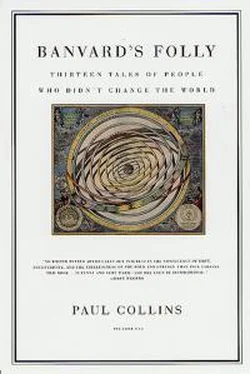For the missing pieces, he cut and pasted in more bits of ornamented cardboard. Soon his bedroom became a regiment of armor pastiches, and at night he would sit up in his bed and stare at them in the moonlight, dreamily imagining himself clad in shining armor and riding up to a dark and forbidding castle.
In the meantime, William ricocheted from school to school, until finally his ill health forced his father to choose the time-honored last resort for parents of the sickly and unpromising: boarding school on the Continent.
William spent four idyllic years in France, and upon his return at the age of seventeen was not only as useless as before but had also developed the impenetrable affectation of a French accent. Despairing of his son's ever making a mark, Samuel Ireland finally prevailed upon a lawyer friend in London to hire the teenager as a lowly clerk.
By this time Samuel had built a middling reputation as an engraver and author of illustrated travelogues of the British countryside. In 1793, when William was eighteen years old, father and son journeyed up the River Avon in pursuit of material for Samuel's planned volume Picturesque Views on the Warwickshire Avon. The pair gravitated to Stratford-on-Avon, the birthplace of William Shakespeare. Young William knew Shakespeare by heart, since every night his father would gather his family after dinner and read them excerpts from the Immortal Bard.
To merchants in Stratford, Samuel must have looked like a moneybag endowed with limbs and a head. For while the Catholic Church invented the first tourist traps--pilgrimage stopovers that sold innumerable slivers of the True Cross and "saint's bones" butchered from unfortunate pigs --Stratford was the first secular tourist trap. No one in town had paid much attention to Shakespeare after his death, but the steady stream of devotees spurred actor David Garrick in 1769 to establish the town's first Shakespeare Festival.
Local shops began offering Shakespeare relics carved from the inexhaustible supply of wood offered by the old mulberry tree that once sat in his backyard; enough Shakespeare personal effects were sold each year to furnish an entire neighborhood.
It was into this gruesome chamber of tchotchkes that Samuel and his son wandered. Samuel enthusiastically snapped up the stool upon which the Bard had once courted Anne Hathaway, as well as a goblet carved from the Great Bard's Most Wonderfully Proliferating Mulberry Tree. Sensing a fine pair of rubes, a local "historian" directed the two to a country estate outside Stratford where--so it was said--old papers of Shakespeare's might still be found. The
antiquarian book collector and his son excitedly rushed out to the country estate of a Mr. Williams, where they were led into a small and gloomy parlor.
Samuel could barely contain himself before he blurted out a question to Williams: had he seen any Shakespeare papers lying about the mansion?
Oh dear, said the expression on the landlord's face.
"By God!" he cried. "I wish you had arrived a little sooner! Why, it isn't a fortnight since I destroyed several baskets-full of letters and papers, in order to clear a small chamber for some young partridges which I wish to bring up alive: and as to Shakespeare, why, there were many bundles with his name wrote upon them."
Williams may have paused here, just to watch the blood drain from his guests'
faces. He then pointed out the room's fireplace.
"Why, it was in this very fireplace I made a roaring bonfire of them. My dear," he called to his wife, "don't you remember bringing me down those baskets of paper from the partridge room? And that I told you there were some about Shakespeare the poet?"
--I told you, his wife replied, not to burn those papers.
Samuel rose from his chair in unutterable anguish, gasping My God! He demanded to be taken to the partridge pens, where he and his son spent the rest of their Stratford stay poking around the rafters and floorboards, all while Mr.
Williams relaxed by the fire downstairs and, one suspects, enjoyed a snifter of brandy and a good laugh.
After they returned to London, the truth dawned on the younger Ireland: they had been had. Samuel Ireland, though, clung tenaciously to his delusions. He put Shakespeare's courting stool in a place of honor in his sitting room, and often invited visitors to rest their backsides upon that very same seat where the Immortal Derri@ere had once sat. Watching this, William now saw his father was gullible. Realizing the full extent of parental fallibility is a jarring moment in young adulthood, all the more so when that parent is widely thought to be smarter than you. William did not gloat in this, but it did present a way by which he might gain that which his father had always withheld: recognition of his son's intelligence and talents as a writer.
The office of Bingley, Esq., was not a busy one, and his employer's many trips out left William Henry plenty of opportunities to haunt old bookstalls, as well as to shut himself into the office to work uninterrupted on poetry; with a vast store of office supplies on hand, in a time when pen and ink were still rather dear for most citizens, Ireland was free to chase whatever literary whim might seize him during his supposed working hours. William Henry set about the fanciful task of writing out some of Shakespeare's plays in longhand--in Shakespeare's hand, to be precise. He did not get very far in this project, but it did give him an idea.
One afternoon in late 1794, while poking through old obscure tracts in a street stall, he came across a small volume of prayers beautifully bound in vellum and stamped in gold with Queen Elizabeth's arms-probably a presentation copy from the author to the Queen. But without any documentation to prove this, it was worth little. Ireland bought it cheaply from the bookseller and took it back to the office. The law records there dated back hundreds of years, giving William Henry a fair notion of what Elizabethan documents looked like. He pilfered a blank sheet of old paper from a file and settled down at his desk to titrate some water into a pot of ink; the weakened solution, applied to the old paper, produced appropriately faded writing. William dipped
his pen and proceeded to write a dedicatory epistle from the author to the Queen-all the proof one needed for the book to become collectible. Once the ink had dried, he tucked the epistle into the front cover and left the office.
His first stop was at Mr. Laurie's, a bookbinder down the street in New Inn Passage. Ireland was well-known to Laurie and his two journeymen, for he had often stopped by with books of his own and his father's in need of repair.
William showed off his epistle and asked them what they thought.
--It certainly looks old, Laurie replied.
But one of the journeymen, examining it more closely, said: I can make a better old ink than that for you. William watched as the journeyman mixed three liquids together in a vial, compounds normally used for marbling the front and end papers of books. The concoction frothed and bubbled for a moment, and settled back into a brownish ink. The journeyman wrote out a few words with it.
--It's very faint, Ireland observed.
The journeyman held the document over an open fire. As the paper warmed and rustled in the updraft, the ink darkened into legibility--and into an oxidized brown tint that perfectly captured the appearance of two-hundred-year old ink.
--One shilling, the journeyman said.
Ireland paid it.
William returned to Bingley's office and, quill in hand, scratched out a new letter to Queen Elizabeth. This forgery he tucked into the little prayer book and took it home with him that evening, where he basked in paternal admiration. His father, delighted by the find, encouraged his son to keep looking in the bookstalls. Perhaps he could succeed in the one pursuit where Samuel had been frustrated--the autograph of William Shakespeare. "I would gladly give half my library for such an autograph," Samuel mused.
Читать дальше











